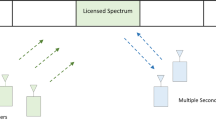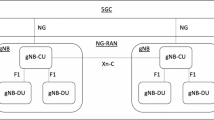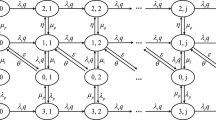Abstract
In this paper we have studied the subcarrier and optimal power allocation strategy for OFDM-based cognitive radio (CR) networks. Firstly, in order to protect the primary user communication from the interference of the cognitive user transmissions in fading wireless channels, we design an opportunistic power control scheme to maximize the cognitive user capacity without degrading primary user’s QoS. The mathematical optimization problem is formulated as maximizing the capacity of the secondary users under the interference constraint at the primary receiver and the Lagrange method is applied to obtain the optimal solution. Secondly, in order to limit the outage probability within primary user’s tolerable range we analyze the outage probability of the primary user with respect to the interference power of the secondary user for imperfect CSI. Finally, in order to get the better tradeoff between fairness and system capacity in cognitive radio networks, we proposed an optimal algorithm of jointing subcarrier and power allocation scheme among multiple secondary users in OFDM-based cognitive radio networks. Simulation results demonstrate that our scheme can improve the capacity performance and efficiently guarantee the fairness of secondary users.
Similar content being viewed by others
References
Mitola, J., et al. (1999). Cognitive radio: making software radios more personal. IEEE Personal Communications, 6(4), 13–18.
Federal Communications Commission. Cognitive radio technologies proceeding (CRTP), ET Docket No. 03-108. Available: http://www.fcc.gov/oet/cognitiveradio/.
Bansal, G., Hossain, M. J., & Bhargava, V. K. (2007). Adaptive power loading for OFDM-based cognitive radio systems. In Proceedings of IEEE ICC (pp. 5137–5142).
Weiss, T., Hillenbrand, J., Krohn, A., & Jondral, F. K. (2004). Mutual interference in OFDM-based spectrum pooling systems. In Proc. of IEEE vehicular technol. conf. (Vol. 4, pp. 1873–1877).
Wyglinski, M. (2006). Effects of bit allocation on non-contiguous multicarrier-based cognitive radio transceivers. In Proc. 64th IEEE veh. technol. conf., fall, Montreal, Canada, Sept., 2006.
Attar, O. Holland, Nakhai, M. R., & Aghvami, A. H. (2008). Interference-limited resource allocation for cognitive radio in orthogonal frequency-division multiplexing networks. IET Commununications, 2, 806–814.
Zhang, Y., & Leung, C. (2008). Subcarrier, bit and power allocation for multiuser OFDM-based multi-cell cognitive radio systems. In Proceedings of IEEE VTC (pp. 1–5).
Zhang, Y. (2008). Resource allocation for OFDM-based cognitive radio system. British: University of British Columbia.
Duy, T., & Tellamubura, C. (2009). Resource allocation for OFDM-based cognitive multicast networks. In Proc. of IEEE WCNC (pp. 1–6).
Qin, T., & Leung, C. (2007). Fair adaptive resource allocation for multiuser OFDM cognitive radio systems. In Proceedings of IEEE ChinaCom (pp. 115–119).
Cheng, P., Zhang, Z., Huang, H., & Qiu, P. (2008). A distributed algorithm for optimal resource allocation in cognitive OFDMA systems. In Proc. IEEE int. conf. communications (ICC), May 2008 (pp. 4718–4723).
Chen, Y., Yu, G., & Zhang, Z. (2008). On cognitive radio networks with opportunistic power control strategies in fading channels. IEEE Transaction on Wireless Communications, 7, 2752–2761.
Eswaran, K., Gastpar, M., & Ramchandran, K. (2007). Bits through ARQs: spectrum sharing with a primary packet system. In Proc. IEEE international symposium on information theory (ISIT), June 2007 (pp. 2171–2175).
Ganesan, G., & Li, Y. (2005). Cooperative spectrum sensing in cognitive radio networks. In IEEE int. symp. new front. dyn. spectrum access networks (DySPAN), Nov. 2005 (pp. 137–143).
Boyd, S., & Vandenberge, L. (2004). Convex optimization. Cambridge: Cambridge University Press.
Shaat, M., & Bader, F. (2010). Computationally efficient power allocation algorithm in multicarrier-based cognitive radio networks: OFDM and FBMC systems. EURASIP Journal on Advances in Signal Processing, 2010, 13.
Hashmi, Z. H. (2008). Dynamic resource allocation for cognitive radio systems. British: University of British Columbia.
Bansal, G., Hossain, M. J., & Bhargava, V. K. (2008). Optimal and suboptimal power allocation schemes for OFDM-based cognitive radio systems. IEEE Transactions on Wireless Communications, 7(11), 4710–4718.
Author information
Authors and Affiliations
Corresponding author
Rights and permissions
About this article
Cite this article
Tang, L., Chen, Q., Wang, G. et al. Opportunistic power allocation strategies and fair subcarrier allocation in OFDM-based cognitive radio networks. Telecommun Syst 52, 2071–2082 (2013). https://doi.org/10.1007/s11235-011-9486-4
Published:
Issue Date:
DOI: https://doi.org/10.1007/s11235-011-9486-4




